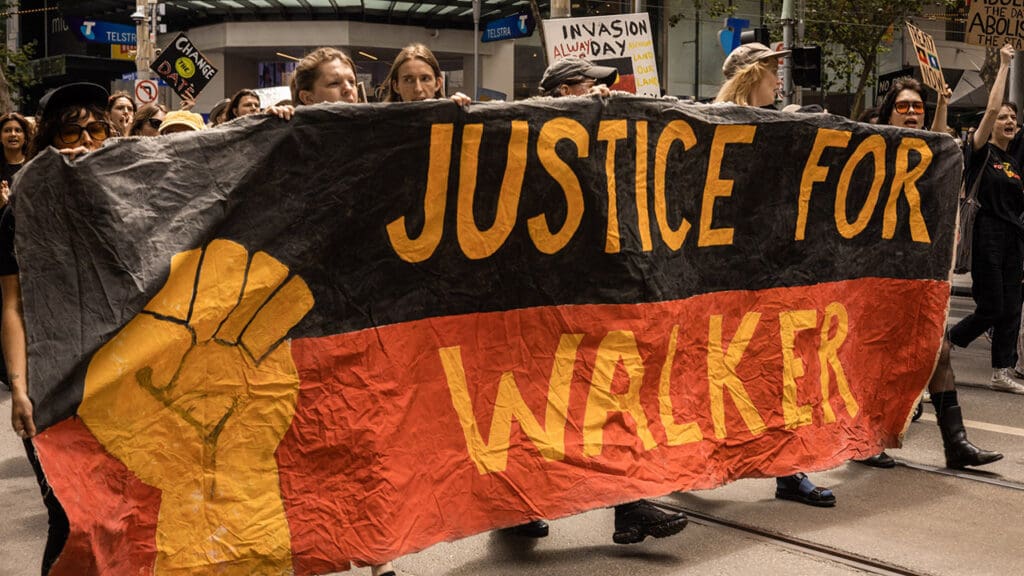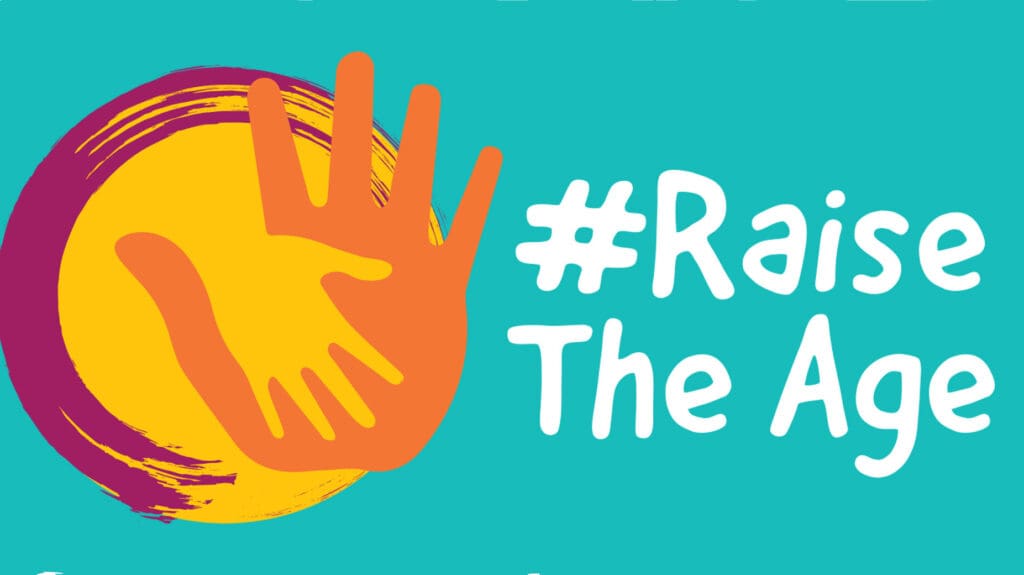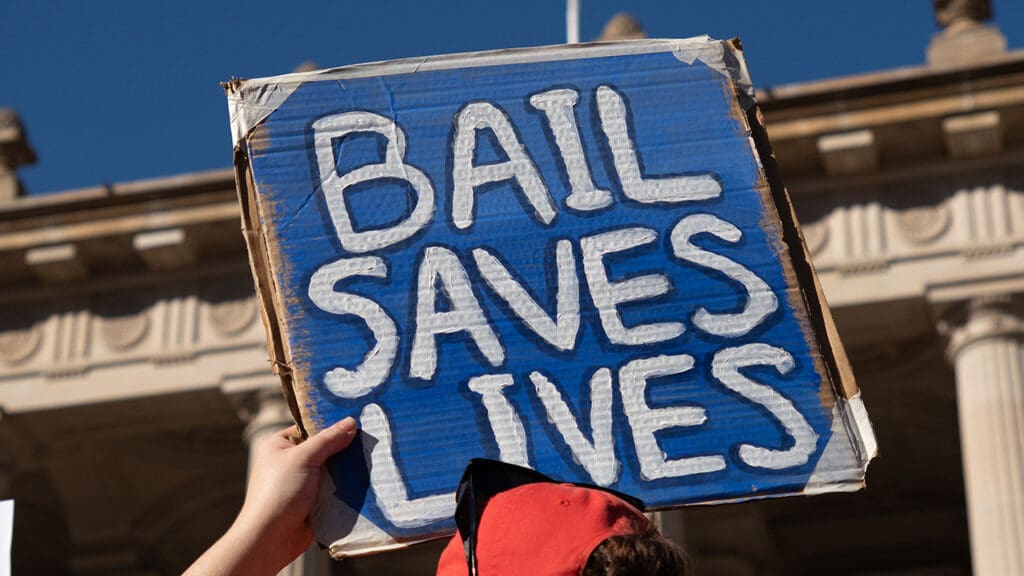Last week, the Allan Labor Government introduced the Bail Further Amendment Bill 2025. The Victorian Aboriginal Legal Service, The Koorie Youth Council, The Aboriginal Justice Caucus, Federation of Community Legal Centres, Human Rights Law Centre and the Law and Advocacy Centre for Women collectively condemn the Allan Labor Government for their single-minded pursuit of a “tough on crime” agenda at the expense of marginalised and vulnerable populations. This Bill is dangerous because it will push people into prison that should not be there. Victoria’s bail laws are at risk of being the most unjust in the country because they will continue to disproportionately target Aboriginal and Torres Strait Islander community members and entrench poverty and disadvantage.
As a collective voice and part of the state-wide Bail Saves Lives campaign, we have been very clear that locking people up is not the way to achieve community safety. This Bill is irresponsible in the context of escalating remand numbers, deplorable prison conditions and a corrections system at breaking point. It is devastating to see the government’s intention so clear; they are using the growing numbers of people on remand for untested allegations, and who may not ultimately receive a sentence of imprisonment, as an indication of their success.
The Allan Labor Government promised that cost-of-living and poverty related charges, as well as women affected by family violence, would not be caught up in the so-called ‘tough’ bail tests. The Bill gives a facade of proportionality and reasonableness, but in reality, the new “high degree of probability” test is akin to automatic pre-trial detention. This new test can require children and adults charged with non-violent crimes to overcome a higher bail test than that which currently applies for murder and rape charges. This is inconsistent with the right to liberty, a protection under Victoria’s Charter of Human Rights. We know that children, young people and women’s lives are already overly politicised and this bill grossly exacerbates the risk of human rights abuse and deaths in custody.
We acknowledge that the Bill includes a schedule of offences that are exempt from the two-step test. We also acknowledge the importance of including pregnancy and caring responsibilities explicitly in s3AAA to guide bail decision makers.. Indeed, we strongly encourage the additional inclusion of family violence and homelessness in s3AAA, and a positive duty upon decision-makers to inquire about disability and other factors listed in s3AAA in determining an application for bail. However, in the context of a new bail test that reduces the relevance of critical considerations about a person’s vulnerabilities (which the government acknowledges in its own Statement of Compatibility), the inclusion of new considerations risks operating merely as a window dressing.
What is missing in the government’s approach is the necessary investment in community-based and self-determined programs and initiatives that will actually address the underlying causes of alleged offending behaviour. Until the Allan Government allocates significant resources into housing, alcohol and drug support, family violence services, mental health services, youth services and legal assistance then they will fall short in their promise of a safer community, and instead continue to cause significant harm to already vulnerable communities.
Bail Saves Lives.
Quotes Attributable to Nerita Waight, CEO of the Victorian Aboriginal Legal Service:
“Bad, ill informed, dangerous policy is being rushed through to win political votes, and it is putting Aboriginal peoples’ lives at risk on a daily basis. I worry what message this sends to our young people, to our women, to our families. We will keep fighting, we will keep advocating for our community whether it’s in the courtroom or with government, to ensure our voices are heard and our rights upheld. The colonial legal system was made to disenfranchise us, to demoralise us and to dehumanise us, so this week is no different. Let me be very clear, we have at least 60,000 years behind us, and we’re not going anywhere. VALS has been serving our people for over 50 years and we will continue to. Our communities are staunch, as they have been for generations of harmful policy.”
Quotes Attributable to Bonnie Dukakis, CEO of the Koorie Youth Council:
“Our children and young people’s lives are once again being recklessly put at risk by this government, in the name of ‘community safety’. I can tell you now, our kids are not safer. As feared, the number of Aboriginal children and young people behind bars has skyrocketed since the last piece of poorly-thought-out bail reform was rushed through earlier this year. This next set is only a disaster waiting to happen for our children, our young people, our families, and our communities. We are willing to work with this government to implement community-led solutions, but they need to come to the table in a genuine way.”
Quotes Attributable to Aunty Marion Hansen and Chris Harrison, Co-Chairs of the Aboriginal Justice Caucus:
“Once again, the Victorian Government has shown blatant ignorance towards Aboriginal communities who continue to call for an end to the overincarceration of our peoples. We warned that proceeding with the second tranche of tough bail laws would lead to more tragic and preventable deaths in custody, yet our warnings are pushed aside by a government who still claim to be committed to Aboriginal self-determination.
The lessons of the Royal Commission into Aboriginal Deaths in Custody must not be ignored. We urge the government to reconsider these harmful amendments and instead work with Aboriginal communities to deliver solutions that keep our people safe whilst addressing the underlying causes of offending behaviour. Funding must also support services that mitigate the harmful impacts of these laws. Anything less puts Aboriginal lives at greater risk.”
Quotes Attributable to Louisa Gibbs, CEO of the Federation of Community Legal Centres:
“We urge the Government to reflect on the evidence that shows keeping people incarcerated on remand without rehabilitation or access to social services increases their chances of reoffending. A true commitment to community safety involves serious investment in early intervention and prevention – in health, education and social services that support our communities to thrive.”
Community legal centres work with victims of crime, people in or at risk of entering the criminal legal system, people experiencing structural disadvantage and racism, people living with disabilities, and Aboriginal clients. This frontline works gives us clear visibility of policies that work and policies that exacerbate problems, and to us it is unanimously and abundantly clear – that tightening bail laws fails to reduce crime in the long term and puts the lives and wellbeing of the human beings locked up at risk.”
Quotes Attributable to Maggie Munn, First Nations Director of the Human Rights Law Centre:
“Bail saves lives, but the Allan Government’s dangerous and discriminatory laws will harm First Nations people, lock people up, and condemn them to the damage and trauma of police and prison cells – without even being found guilty of an offence.
These dangerous bail laws undermine people’s rights under Victoria’s Charter of Human Rights. They are a disaster waiting to happen and will lead to more people dying in custody. Rather than regressive laws which violate people’s human rights, the Allan Government should implement Poccum’s Law in full to make Victoria’s bail laws safer and fairer for everyone.”
Quotes Attributable to Elena Pappas, CEO of the Law and Advocacy Centre for Women:
“There have been countless inquiries, coronial inquests, submissions and recommendations made in relation to the shameful rates of Aboriginal incarceration in this country. Yet our governments continue to ignore these recommendations. Far from addressing the underlying causes of offending, these bail laws will entrench criminalisation and fail to make our communities safer in the long term.
Whilst the inclusion of pregnancy and caregiving as an explicit consideration is a welcome reform, these bail laws will no doubt see more mothers and primary carers imprisoned. Even short periods of imprisonment impact families and communities and can have devastating long-term effects. We know that children whose mothers are in prison are more likely to have disrupted education, poor health and unstable housing. It is these factors, of course, that heighten the risk of a young person entering the justice system, further entrenching the care to prison pipeline.”







